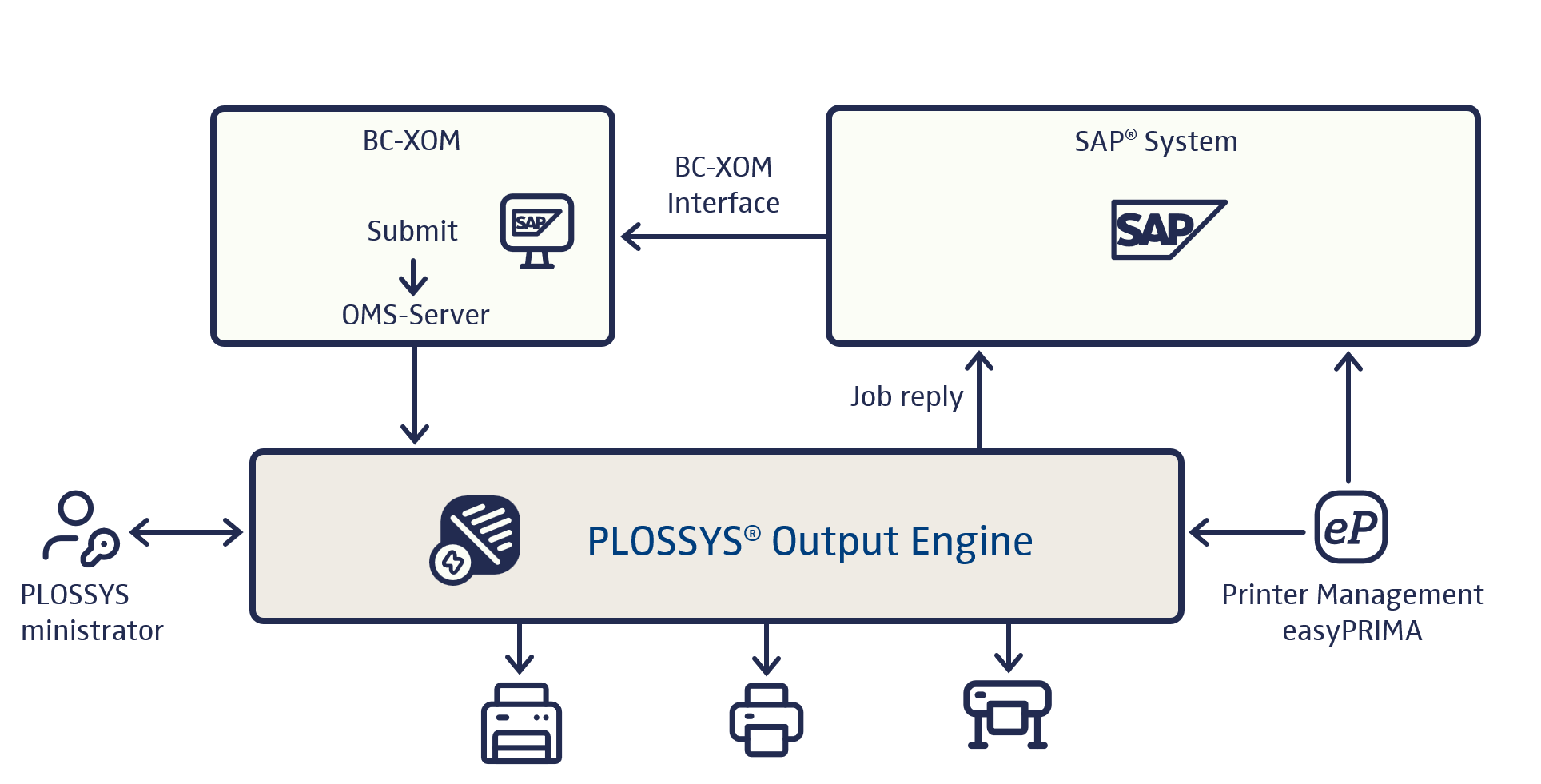Configure Output from SAP Spool¶
The printer is configured for BC-XOM in the SAP system. The BC-XOM interface from SEAL Systems accepts the job and transmits it via IPP or IPPS to the Output Engine server. PLOSSYS Output Engine processes the job and returns the job status to the SAP system via RFC callback.

If you use PLOSSYS Output Engine on RHEL 8 and newer, download and install the seal-co-notifier-2.9.23-9999.x86_64.rpm patch.
If you use PLOSSYS Output Engine on RHEL prior to version 8 and you want to send replies to SAP, you have to install the /lib64/libstdc++.so.6 library explicitly. For more information, refer to https://launchpad.support.sap.com/#/notes/2338763.
Install SAP NetWeaver RFC¶
-
Open SAP Launchpad in a Web browser:
https://launchpad.support.sap.com/ -
Log on with your SAP user name and password.
-
In SAP Launchpad, search for the OSS number
2573790. -
Follow the download link for
SAP NW RFC SDK 7.50and save the current version. -
Unpack the downloaded ZIP archive:
unzip <downloaded_zip_archive> -
Copy the directory tree from
nwrfcsdkinto the following directory:/usr/local/
Configure SAP NetWeaver RFC with an Application Server¶
-
Create
/etc/ld.so.conf.d/saprfc.confwith the following content:/usr/local/nwrfcsdk/lib -
Execute the following command:
sudo ldconfig -
Create the following directory unless it already exists:
sudo mkdir -p /opt/seal/etc -
If the connection to the SAP system is established via an application server, specify the SAP connections settings in the SAP configuration file
/opt/seal/etc/sapnwrfc.iniwherebySAPROUTERis set to/H/<name_saprouter>.Example - SAP configuration file
sapnwrfc.iniDEST=W74 ASHOST=10.100.100.100 TRACE=0 USER=sapuser PASSWD=sappassword CLIENT=310 SYSNR=01 SAPROUTER=/H/roeadm003.sealsystems.localThe
sapnwrfc.iniconfiguration file has the same syntax assaprfc.ini.Literature -
saprfc.iniThe
saprfc.inifile is described in SAP Basis Configuration - Server. -
Restart the following service:
seal-co-notifier
Configure SAP NetWeaver RFC with a Message Server¶
-
Create
/etc/ld.so.conf.d/saprfc.confwith the following content:/usr/local/nwrfcsdk/lib -
Execute the following command:
sudo ldconfig -
Create the following directory unless it already exists:
sudo mkdir -p /opt/seal/etc -
Enter the connection data of the SAP system into
/opt/seal/etc/sapnwrfc.iniwherebyMSSERVis set to36<SYSNR>andSAPROUTERto/H/<name_saprouter>.Example - SAP configuration file
sapnwrfc.iniDEST=WMS R3NAME=W74 GROUP=PUBLIC MSHOST=10.100.100.100 MSSERV=3601 CLIENT=000 USER=rfctest PASSWD=ides1234567 TRACE=0 SAPROUTER=/H/roeadm003.sealsystems.localThe
sapnwrfc.iniconfiguration file has the same syntax assaprfc.ini.Literature -
saprfc.iniThe
saprfc.inifile is described in SAP Basis Configuration - Server. -
Restart the following service:
seal-co-notifier
Configure BC-XOM in SAP¶
Literature - BC-XOM
The configuration of BC-XOM in SAP is described in OMS Interface for SAP (BC-XOM).
Hint - supported
PLOSSYS Output Engine only supports OMS Server or OMS Submit and the transmission via IPP.
Configure the SAPGOF Converter on the Output Engine Server¶
Literature - SAPGOF Converter
For further information about how to configure the SAPGOF Converter, refer to the SAPGOF Converter documentation.
By default, the SAPGOF Converter uses the following configuration files:
-
/opt/seal/seal-convert-sapgof/lib/config/CONFIG -
/opt/seal/seal-convert-sapgof/lib/config/GRIBS74_PDF_DB
For using another configuration, specify the following Consul keys:
-
CONFIG: Customized content of theCONFIGconfiguration file -
GRIBS74_PDF_DB: Customized content of theGRIBS74_PDF_DBconfiguration file
Import the CONFIG File with PLOSSYS CLI¶
-
Copy
/opt/seal/seal-convert-sapgof/lib/config/CONFIGtoconfig_tmp.yml. -
Adjust
config_tmp.ymlaccording to the YAML format by indenting each line by four blanks and inserting the following lines at the beginning of the file:convert-sapgof: CONFIG:Hint - syntax
The data consists of multiple lines. For preserving the line endings, store the value in literal style, indicated by a
|. You have to indent all lines of the text. The leading spaces will not be part of the data retrieved by the service.Example - literal style
convert-sapgof: CONFIG: | This is a multiline value. -
Customize the settings in
config_tmp.ymland save the file. -
plossys config import config_tmp.yml` -
Restart the following service:
seal-convert-sapgof
Import the GRIBS74_PDF_DB File with PLOSSYS CLI¶
-
Copy
/opt/seal/seal-convert-sapgof/lib/config/GRIBS74_PDF_DBtogribs_tmp.yml. -
Adjust
gribs_tmp.ymlaccording to the YAML format by indenting each line by four blanks and inserting the following lines at the beginning of the file:convert-sapgof: GRIBS74_PDF_DB: -
Customize the settings in
gribs_tmp.ymland save the file. -
plossys config import gribs_tmp.yml -
Restart the following service:
seal-convert-sapgof
Advanced Configuration¶
The following keys influence the behavior of the output from SAP:
-
MAX_INSTANCES: Maximum of parallel conversions -
TIMEOUT: Time interval after which a conversion is aborted if it has not generated any new data
For how to configure the stamping of SAP output jobs, refer to Configure Stamps from SAP Output Jobs.
Literature - SAPGOF Converter
For further information about how to configure the SAPGOF Converter, refer to the SAPGOF Converter documentation.